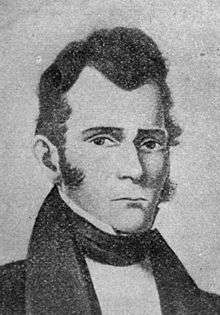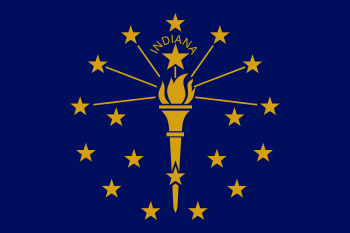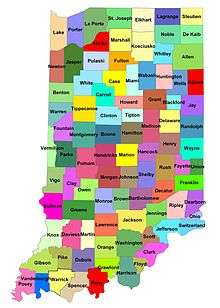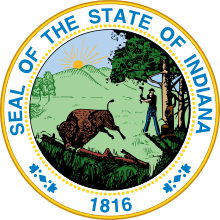John Tipton
| John Shields Tipton | |
|---|---|
 | |
| United States Senator from Indiana | |
|
In office January 3, 1832 – March 3, 1839 | |
| Preceded by | Robert Hanna |
| Succeeded by | Albert S. White |
| Member of the Indiana House of Representatives | |
|
In office 1819–1823 | |
| Personal details | |
| Born |
August 14, 1786 Sevier County, Tennessee |
| Died |
April 5, 1839 (aged 52) Logansport, Indiana |
| Political party | Democratic |
| Military service | |
| Service/branch | Militia |
| Unit | Yellow Jackets |
| Commands | Indiana Rangers |
| Battles/wars |
Tecumseh's War • Battle of Tippecanoe War of 1812 • Battle of Tipton's Island • Siege of Fort Wayne |
John Shields Tipton (August 14, 1786 – April 5, 1839) was from Tennessee and became a farmer in Indiana; a veteran officer of the War of 1812, in which he reached the rank of Brigadier General; and politician. He was elected to the state House and in 1831 as US Senator from the state of Indiana, serving until 1838. He was appointed as US Indian Agent and was selected to lead the militia in removing Menominee's band of Potawatomie in 1838; they were relocated to Kansas, Indian Territory.
Biography
Tipton was born in what is now Sevier County, Tennessee. His father was killed by Native Americans. His great uncle, also named John Tipton, was a prominent man in the area. When Tipton was an infant, his uncle's house was besieged by supporters of an effort to create the 14th state in Northeastern Tennessee called the State of Franklin.
At the age of 17, Tipton moved to Harrison County, Indiana. In 1806 he married Martha Shields.[1] He became a farmer. Fighting various Native American tribes in the area, he commanded a militia unit of the Yellow Jackets in the Battle of Tippecanoe campaign in 1811. He served as Major in command of two companies of Indiana Rangers at Fort Vallonia during the War of 1812 with Great Britain.[2] When peace was declared, Tipton was promoted to Brigadier-General.[3]
Tipton's marriage eventually fell apart and he was divorced in 1816.[4] He entered politics, being elected as a member of the Indiana State House of Representatives and serving two terms, from 1819 to 1823. During this time, he founded the town of Columbus, Indiana originally known as Tiptonia. He also participated in commissions to establish a new state capital for Indiana and to set the boundaries between Indiana and Illinois. In 1823, he was appointed as the United States Indian agent for the Potawatomi and Miami tribes.
In 1825, he married again, this time to Matilda Spencer, the daughter of the late Captain Spier Spencer. Her father died at the Battle of Tippecanoe in 1811.[5]
In 1831, Tipton was elected by the state legislature to a seat in the United States Senate from Indiana to fill the unexpired term of James Noble who had died. He was reelected to a full term in 1832. A member of the United States Democratic Party, Tipton was a strong supporter of Andrew Jackson.
He served as chairman of the committees on roads and canals and Native American affairs from 1837 to 1839. In 1838, at the behest of Governor David Wallace, Tipton was selected as captain of the militia to organize the forced removal of 859 Potawatomi from the vicinity of Plymouth, to which they had agreed by treaty. He started the group on the two-month-long "Trail of Death" to Kansas. More than 40 of the natives died, most of them children.
Death and legacy
Tipton declined to run for reelection due to poor health, and his term expired a month before his death. He died in Logansport, Indiana, a town that he helped to found. He is interred in Mount Hope Cemetery in Logansport, Indiana.[6]
The towns of Tipton, Indiana,[7] and Iowa,[8] and Tipton County, Indiana are named after him.[9]
References
- ↑ Indian Treaty of 1826 - Tipton's Quest, by Carl Leiter
- ↑ Allison, Harold (1986). The Tragic Saga of the Indiana Indians. Paducah: Turner Publishing Company. p. 246. ISBN 0-938021-07-9.
- ↑ Pershing, Marvin W. Life of General John Tipton and Early Indiana History. Tipton literary and Suffrage Club. Also on archive.org
- ↑ Indian Treaty of 1826 - Tipton's Quest, by Carl Leiter
- ↑ Indian Treaty of 1826 - Tipton's Quest, by Carl Leiter
- ↑ "Gen John Tipton". Find A Grave. Retrieved August 31, 2012.
- ↑ "Profile for Tipton, Indiana, IN". ePodunk. Retrieved August 31, 2012.
- ↑ "Profile for Tipton, Iowa, IA". ePodunk. Retrieved August 31, 2012.
- ↑ "Profile for Tipton, Indiana, IN". ePodunk. Retrieved August 31, 2012.
External links
- John Tipton Collection, manuscript collection finding aid, Indiana State Library.
- John Tipton Collection, digital collection of ISL manuscripts at Indiana Memory.
- John Tipton Papers, Vol. 1, 1809-1827, documentary edition published by the Indiana Historical Bureau, 1942.
- John Tipton Papers, Vol. 2, 1828-1833, documentary edition published by the Indiana Historical Bureau, 1942.
- John Tipton Papers, Vol. 3, 1834-1839, documentary edition published by the Indiana Historical Bureau, 1942.
- John Tipton Biography at Congress.gov
- John Tipton Portrait
- Find A Grave
| United States Senate | ||
|---|---|---|
| Preceded by Robert Hanna |
U.S. Senator (Class 1) from Indiana 1832–1839 Served alongside: William Hendricks and Oliver H. Smith |
Succeeded by Albert S. White |



